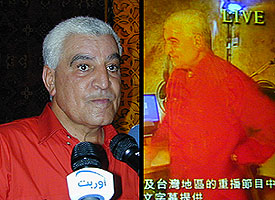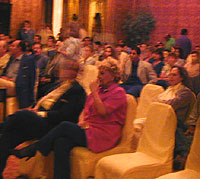|
DISPATCH

Coming soon:
Secret Door, the sequel?
National Geographic's
live archaeology event ended with a dud -- and a bit of controversy. Cairo
Live was there.
Photos and
text by Tarek
Atia
(cairolive.com, September 18,
2002) It's a cocktail party atmosphere at the Khalifa ballroom at
the Mena House hotel. We are just a few meters away from the main
attraction of tonight's show -- the Great Pyramid of Giza.
It's 2:45am and the room is full
of bleary-eyed journalists who will be watching a live feed of the
crazy, fascinating events going on outside.
Among the two-hour show's highlights: the
oldest sealed sarcophagus ever discovered in Egypt will be opened up,
and a tiny robot will travel down an air shaft in the pyramid to
discover what lies behind a secret door.
Anticipation is rife -- what will
this show be like? Silly and fake, like the Fox special of a couple of
years ago at the Bahariya Oasis -- or more serious minded because this
time National Geographic is involved?
"You've seen Pyramid shows
before, but nothing like this," says the ad.
 "I've
been waiting for this moment all my life," says Zahi Hawass, head
of Egypt's antiquities, and the main "talent" of the show
itself. Hawass is a natural story-teller and very media friendly -- the
camera loves him and he loves it back. "I've
been waiting for this moment all my life," says Zahi Hawass, head
of Egypt's antiquities, and the main "talent" of the show
itself. Hawass is a natural story-teller and very media friendly -- the
camera loves him and he loves it back.
Hawass is good because he's both
a learned expert and a hands-on archaeologist. With his trademark red
shirt and cowboy hat, he's also very much like an Egyptian Indiana
Jones. He's a joker, as well, telling host Jay Schandler that the poisonous
curse of the mummy may harm Jay but not Zahi himself.
There are some stars here at the
Mena House watching the event -- friends of Hawass including actresses
Nadia Lutfi and Poussy. Nadia Lutfy tells me that she expects they'll
find the equation of knowledge behind the door, the one
humanity has been missing since the age of the Ancient Egyptians.
The veteran actress says Hawass is a natural
actor, but not in the traditional sense.
"He's a scholar who doesn't want to stay in the background, who's
right up front: a leader."
The show features actors dressed
in ancient Egyptian garb recreating scenes from the pyramid-building
period with the help of slick 3D graphics. These are interspersed with
actual scenes of some of the discoveries of the camps which are thought
to have housed the pyramid builders, currently being excavated near the
pyramids. Meanwhile, a second smaller screen shows the robot and how
many feet are left before it reaches the secret door.
 All
in all the show is indeed more refined than previous efforts, with the
help of haunting music, and a more subdued anticipation than usual.
Perhaps Laura Greene, the pretty host with the English accent helped
give the show its hip, but weighty tone. She describes how during the
trial runs in the lead up to the show, the robot suddenly fell 180 feet
and they had to fix it. All
in all the show is indeed more refined than previous efforts, with the
help of haunting music, and a more subdued anticipation than usual.
Perhaps Laura Greene, the pretty host with the English accent helped
give the show its hip, but weighty tone. She describes how during the
trial runs in the lead up to the show, the robot suddenly fell 180 feet
and they had to fix it.
In addition to the 141 countries
around the world, the show is also airing live on Nile TV, the Egyptian
Satellite channel and Egyptian channel 2, with local commentary
replacing the many, many ads -- but is anybody watching? It turns out
that some did indeed stay up, or wake up early especially to witness the
event.
Overall, however, the program is
too long, the anticipation too thin. The sarcophagus is a bit of a
disappointment, just a bunch of bones. And
finally, in the last few seconds of the two-hour show, the moment we've
all been waiting for: behind the secret door, the camera reveals yet another
sealed door.
Which means they're leaving room
for a sequel, of course.
"Leave it to the Americans
to milk it for all it's worth," says Robert Bauval, best selling
author of alternate pyramid theory books. Bauval is not impressed by the
show, and questions why not much attention was given to the original German
discoverer of the first secret door. In fact, says Bauval, they were
going to ignore him altogether but petitions were signed, and so the
German was actually mentioned.
I tell Bauval, however, that in
many ways programs like this, with their hyped-up talk of secrets and
mysteries, actually show that his form of archaeology is gaining popularity
and coloring the lingo of more traditional archaeology.
When I ask Hawass the same
question later, he says, "The Pyramids are all mysteries. The most
important thing is that when you want to respond to the extreme popularity
of Bauval and others, you have to use the same exciting methods. That
way you'll reach a wider audience with the truth."
At the press conference
afterwards, Hawass is sweating like mad. Two questions from a gaggle of
journalists enrage him. One, from an Al-Jazeera correspondent, implores
him to comment on the fact that the show was broadcast at the exact same
time of Yom Kippur prayers in the US. Hawass says there's no relation.
 Meanwhile,
Hawass's friend, actress Nadia Lutfy gets very upset and starts a
parallel yelling match with the Al-Jazeera journalist. Another
journalist questions whether the discovery was really live -- and
implied that it couldn't have really been live due to "national security"
reasons. Again, Hawass loses his temper. "What national security
are you talking about?" he yells. "Why can't you be a great
Egyptian?" Meanwhile,
Hawass's friend, actress Nadia Lutfy gets very upset and starts a
parallel yelling match with the Al-Jazeera journalist. Another
journalist questions whether the discovery was really live -- and
implied that it couldn't have really been live due to "national security"
reasons. Again, Hawass loses his temper. "What national security
are you talking about?" he yells. "Why can't you be a great
Egyptian?"
The producers would not be specific
about how much was spent on the show. Tim Kelly, president of National
Geographic TV, tells me the robot cost 200,000 dollars and that the
money spent on the show was in the millions. He won't answer questions about
sponsorship or ratings but admits that it was a tough sell because they
were running against Monday Night Football in the States.
I ask John Bredar, the show's
executive producer and writer, if the public is sick of this kind of
stuff or thinks its fake. He says people cant get enough. "There
may be a saturation of mediocre programming about Egypt, but a program
with bona fide archaeology, two dramatic finds, and a happy marriage
between things that are cool to watch and serious minded works
well."
"Geographic is media
goodness," he claims. "And we go through a lot of steps to
ensure accuracy... We bring in the science police."
FLASHBACK: Mummy's the word!
WHAT
DO YOU THINK?

MAKE YOUR
VOICE HEARD
Send a comment to cairolive.com

Disclaimer
and Terms of Use
© Copyright 1996-2005 cairolive.com. All Rights Reserved
|